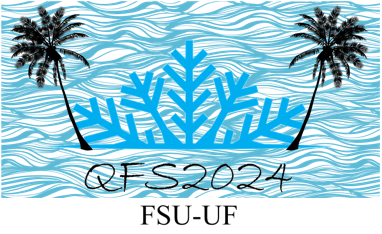LECTURES ON QUANTUM COMPUTING
Lecture 1 – 5:30 – 7:00 PM on 7/26
Stephen A. Lyon
Title: Quantum Computing: Where Have We Come? Where Are We Going?
Abstract: Quantum mechanics underpins the technologies we all use for computing, yet all operations are inherently classical; purely classical devices could perform these same operations. During the 1980s and 90s, physicists began to explore whether expanding the range of device operations to include all those allowed by quantum mechanics would offer inherent advantages. They concluded that incorporating superposition and entanglement of quantum states does provide practical computing benefits. Specifically, some computations that are believed to require exponentially increasing time to solve as the problem size grows for classical computers can be solved in only polynomial time by a fully quantum computer. However, theorizing a quantum computer and building one are vastly different challenges. Physicists from various branches, including photonics, cold neutral atoms, trapped ions, electrons in condensed matter systems, and superconductivity, have developed promising approaches to constructing a quantum computer. One significant challenge in the quantum realm, as opposed to classical bits, is error correction. The “No Cloning Theorem” prevents us from simply making and storing extra copies of quantum bits (qubits). Without a breakthrough in quantum error correction, nearly all our qubits will be dedicated to detecting and correcting errors. This means that even a modest-sized error-corrected quantum computer will require a large number of qubits, thus much of the current effort in the field focuses on learning how to scale technologies to sufficiently large systems to be of practical value. I will discuss some of these proposed technologies, including using the spin of individual electrons in a semiconductor or bound to the surface of superfluid helium as qubits.
Bio: Stephen Lyon has been a Professor of Electrical and Computer Engineering at Princeton University for several decades, with his research mainly centered on semiconductor physics and quantum structures. He has also recently joined a startup company – EeroQ Quantum Hardware – which aims to commercialize electron qubits bound to the surface of superfluid helium. Prof. Lyon became interested in the physics of quantum information processors 20 years ago, originally working on electron spin qubits in silicon. His group established that the spin of an electron in high purity isotopically enriched Si could maintain coherence for over 10 seconds. However, he also became interested in the possibility of using the spin of electrons bound to helium as qubits, since the near absence of a spin-orbit interaction leads to even longer spin coherence, especially for mobile electrons. His research has concentrated in this area for the last 6 or 8 years.
Lecture 2 – 5:30 – 7:00 PM on 7/27
Alan Ho
Title: Quantum Supremacy 5 years later
Abstract: In June 2019, Google’s experimentalists verified from its quantum computer that it accomplished the milestone of quantum supremacy—namely, performing a calculation on a quantum computer that cannot be performed on a classical computer within a reasonable time. This talk discusses the experiment that was performed and the superconducting qubit hardware requirements needed to perform such an experiment. We describe what needs to happen in order to reach the second milestone—quantum supremacy for condensed matter physics simulations. We first present a deep dive into the challenges of fabrication—namely, eliminating the microscopic origins of TLS—which is required to increase the coherence of qubits. We propose other techniques such as four-qubit interactions, which can further compress quantum circuits of interest. Finally, we propose a condensed-matter phase transition experiment that cannot be classically simulated.
Bio: Alan Ho is the CEO of Qolab, a superconducting qubit startup focused on the fabrication of high-quality qubits. He received an Engineering Physics undergraduate degree from the University of British Columbia. He worked as a semiconductor process engineer at Triant Technologies and held management positions in Amazon and Dell cloud services. He founded his own mobile analytics company, InstaOps. At Google’s Quantum AI team, he led product and business development, launched quantum open source projects (Cirq/TensorFlow Quantum), and a quantum computing service. He also established collaborations with US national labs and served on the QED-C.
